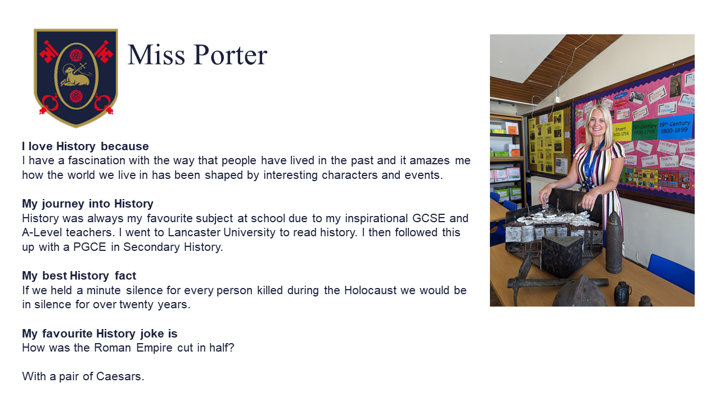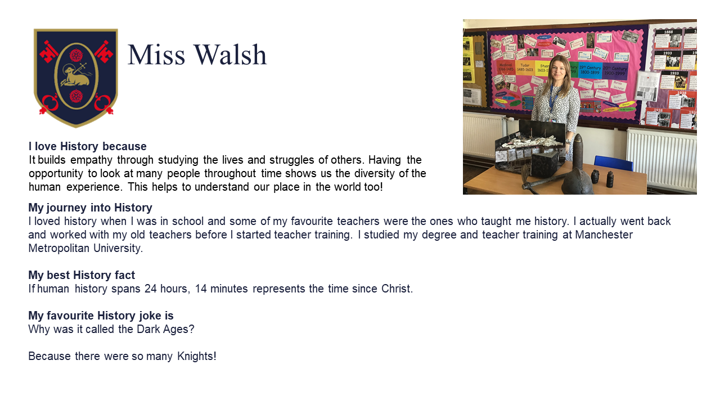Subject: History
CURRICULUM INTENT
History follows a 5-year plan, rather than a Key Stage 3/4. This is challenging and ambitious as resources and skills are taken from GCSE specification and are scaffolded from Year 7, this allows pupils to demonstrate their gifts and talents within the subject and carry these through their time at school.
The learning for all is linear; knowledge must be acquired first before understanding, but the topics and skill-set required to access, interpret the information and draw conclusions are quite complex meaning most progress will be made at the end of a topic and accelerate as the pupils become more confident, and let their light shine, with their understanding of concepts. Students develop the five key concepts using evidence, interpretations, significance, change and continuity and cause and consequence starting in Year 7.
The KS2 curriculum plan has been referenced so there is repetition to nurture the initial skills and knowledge in Year 7 as not all students will have the same foundations. Our curriculum provision builds into this and is structured in a way that supports and challenges thinking and develops compassion and respect of the past. Pupils are encouraged to develop a chronological framework of British History by studying a wide range of historical periods from Roman Britain to institutionalised racism in the modern-day police force. This enables students to study the past from a variety of standpoints and to make connections and comparisons over time. In turn, this allows us at school to foster an attitude of deeper reflection on what history means to us now, and what its vastness and beauty tells us about God and his creation.
IMPLEMENTATION
A variety of approaches are taken to teaching History so lessons are stimulating and engaging. Pupil voice is used and feedback from pupils reflected upon in working parties to improve the learning experience.
Programmes of Study
Year 7
The Anglo-Saxons, The Norman Conquest, Herstory, Power in Medieval England, Tudors; Henry VIII & The English Reformation.
Year 8
Elizabethan England, The English Civil War, Empire, The transatlantic slave trade: effects and abolition, The Industrial Revolution, Local History study Quarry Bank Mill.
Year 9
The First World War, Dictators of the 20th Century, Nazi Germany, The Holocaust, Minority Rights in the 20th Century.
Click here to view the Year 9 Options information for History.
Year 10
Thematic Study: Power and the People, Elizabethan England; 1568-1603
Year 11
Germany 1890−1945: Democracy and Dictatorship, Conflict and Tension 1918−1939
IMPACT
Marking and Assessment
Five Year curriculum.
Exercise books are for pupils to take down class notes and express their learning and develop thoughts. Therefore, the marking of class work is not required so is not routine practice.
Home learning tasks are set weekly/ fortnightly, and shorter tasks will be marked by the teacher or peer/ self-assessed using green/purple pen. General and specific comments are given for pupils to then self/ peer correct. At GCSE extended writing is set once a week and shorter tasks once a week also.
Modelling of marking and feedback on home learning is done in detail to the whole class. Key ideas/ theories and misconceptions are then highlighted and corrected onto pupil work. Feedback is verbal and this is to the whole class, but individuals may be highlighted too.
At KS3 Assessment feedback sheets are used for all formal assessments which give quantifiable feedback.
Within KS4 assessments pupils are awarded a mark according to GCSE criteria along with specific feedback on how to improve. Written work will have teacher annotation, comments, advice and/or targets for pupils, if appropriate. We are consistent in regular monitoring using a variety of methods to assess learning, E.G. peer and self-assessed marking. Outstanding marking will encourage the use of subject specific vocabulary and applied knowledge and skills.
Examinations
At GCSE pupils are tested on the current topic for end of unit tests, knowledge and exam based. Pupils will also start a new topic by revisiting the previous topic using a knowledge test.
Revision Guides / Resources
OUP Revision guides, revision workbooks/checklists in firefly.
Staff Details
Miss V Walsh - Head of Humanities
Mr J Johnson - Teacher of Humanities, Head of Year 10
Miss S Porter – Teacher of History, Head of Year 11
Careers and Progression
Any career will welcome History as a GCSE! Our curriculum model is a skilfully sequenced, broad and coherent knowledge pathway, which leads students to success at GCSE and A-Level.
As a student of History all pupils are taught to challenge evidence and identify bias. These skills are useful in the in the following career pathways; Law, politics, Business, marketing and economics.
History 5 year Curriculum Plan
Click on an image below and scroll through using the arrows.


.jpg)